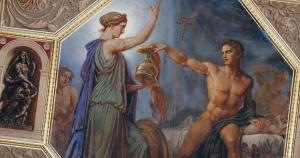I asked for new voices and got some outstanding writers! Today we hear from the erudite James R. Harrington.
 James R. Harrington earned his M.A. in Ancient History at California State University Fulleron and is a member of the Torrey Honors Institute. James has been a classical educator in a variety of settings over the past thirteen years. He lives in Houston with his wife, Sharon, and their daughter.
James R. Harrington earned his M.A. in Ancient History at California State University Fulleron and is a member of the Torrey Honors Institute. James has been a classical educator in a variety of settings over the past thirteen years. He lives in Houston with his wife, Sharon, and their daughter.
Mr. Harrington responded to thoughts on his first post.
Harrington wrote about the shield of Herakles,
He continued to the shield of Aeneas and now is following up on that first post:
In the previous post on the Shield of Aeneas, we saw how Virgil moves from the generic scenes of Achilles’ and Herakles’ shields to specific moments in the Roman past in order to express his hope that Caesar Augustus will lead the world into an era of universal peace. Today’s post focuses on the circumstances surrounding the gift of Aeneas’ shield and what they reveal about Virgil’s attitude toward his Greek sources.
At first glance, the Aeneid appears strongly anti-Greek. The defeated Trojans, not the Greeks, are the heroes of the epic. Odysseus in particular comes off as a weasel, and we are told that Aeneas’ opponent, Turnus, is a new Achilles. Given how closely the structure of the Aeneid follows that of the Odyssey and then the Iliad, it can give the impression that Virgil is trying to undo Homer by some process of literary alchemy. We should take careful note, then, that at the moment when Aeneas receives his shield and prepares to bear Rome’s future on his shoulders, he is forging an alliance with a band of Greeks (Aeneid Book VIII). These Greeks, like the Trojans, are exiles who have found a new home in Italy. Their captain is named Evander, which roughly corresponds to the Greek for “good man.” His son, who will go with Aeneas to seal the alliance, is named Pallas after Pallas Athena, the goddess of Wisdom and patroness of Achilles, Odysseus, and Herakles. Thus, Evander, Pallas, and their men represent all that Virgil sees as good and wise in Ancient Greece. Like Herakles the culture-bringer in pseudo-Hesiod’s Shield of Herakles, Aeneas finds them in the process of bringing pure worship and festivities to a sacred grove. In fact, the god Evander’s people worship is none other than Herakles the culture-bringer! For Virgil, there are Greeks and then there are Greeks.
This is important to Virgil’s project as depicted on Aeneas’ Shield. Herakles was, according to myth, the son of god. Unlike Achilles, who learns that all men, even sons of gods, must die, Herakles is allowed to work his way back to Olympus, after an excruciating death, to join the gods as an Olympian. It is this notion—that a man who suffers nobly for his people can become a god—that Virgil attributes to his “good Greeks,” Evander and Pallas. The possibility that noble suffering could have a cosmic outcome is important to Virgil. His hero, Aeneas, is both a son of the goddess Venus, and a forefather of Julius Caesar, adoptive father of Virgil’s patron, Caesar Augustus. Julius Caesar was declared divine by the Senate shortly after his death, and the title his heir Octavian received as “Augustus” accorded him semi-divine status in his lifetime and godhood after his death. As we saw in the previous post, Virgil hopes that Augustus is a man god-like enough to change the course of human history and bring an end to the reign of Strife. Does Virgil believe it is possible? Perhaps not, but the circumstances surrounding Aeneas’ reception of his heroic shield suggest that Virgil finds hope in the story of the Greek god-man, Herakles.












